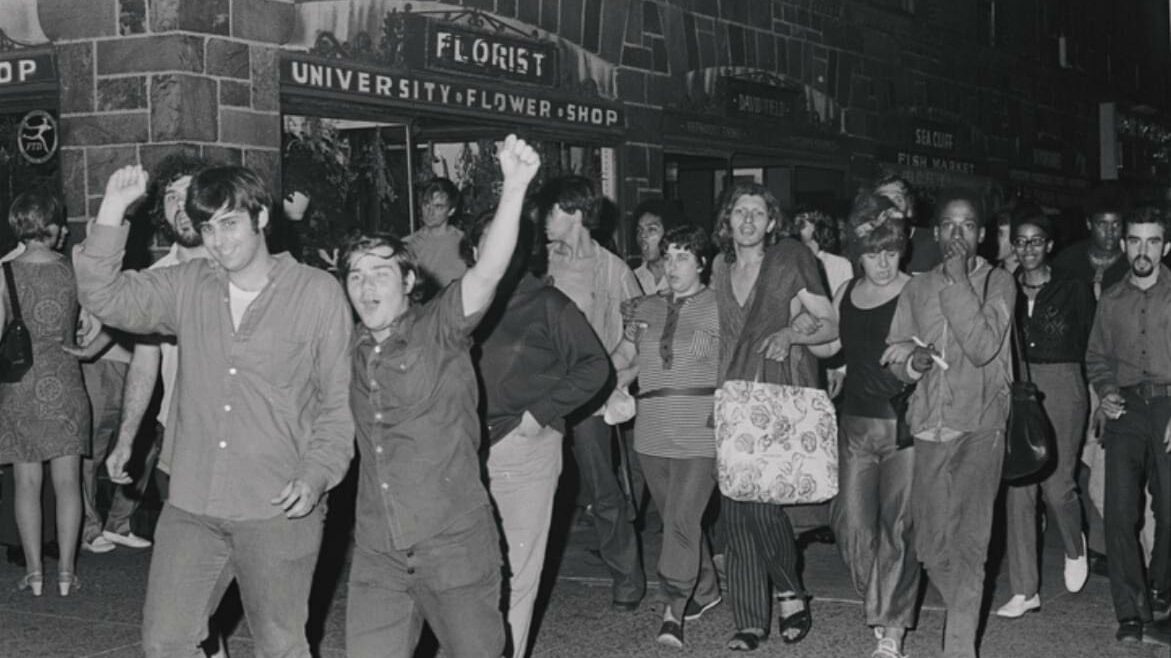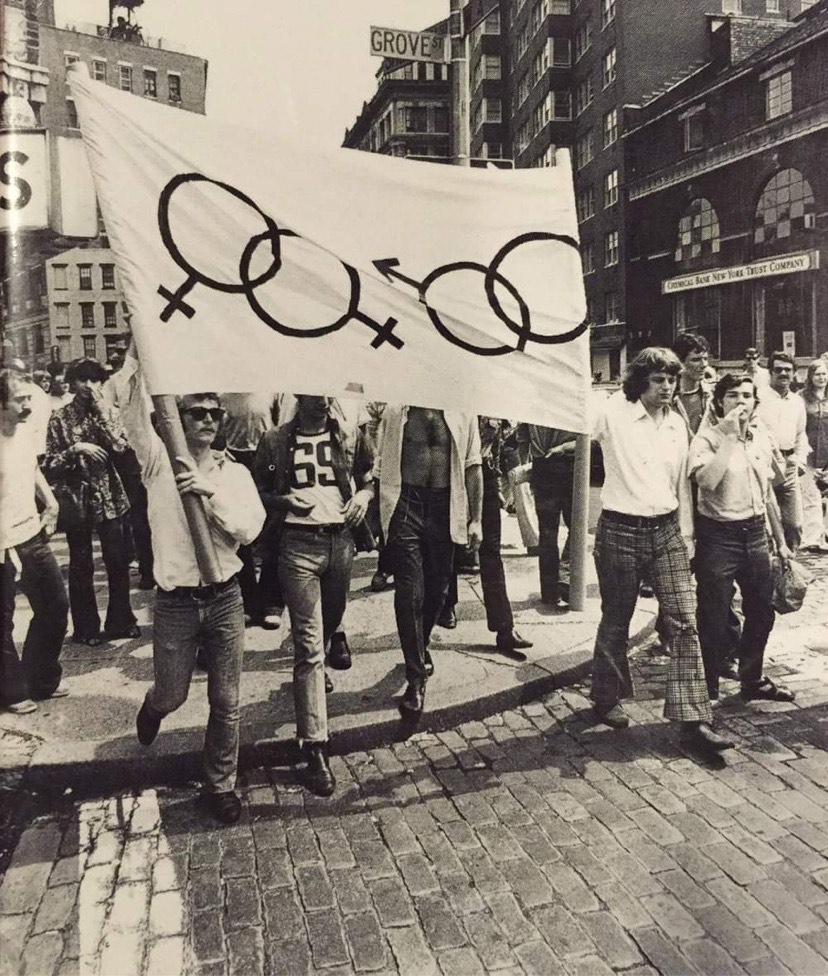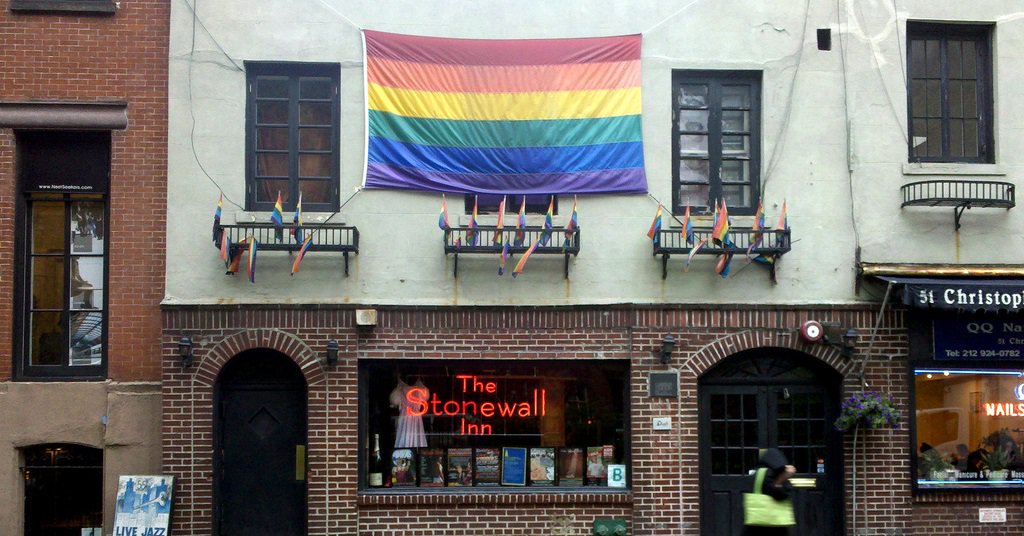‘There was no first brick’: The Stonewall Riots remembered – by someone who was there
"When I die I don’t want to be remembered for Stonewall"
By Mark Segal

The Stonewall Riots, took place 54 years ago today, in the early hours of June 28.
This was when the New York Police Department raided the Stonewall Inn and sparked the Stonewall Riots, which are considered the birth of the modern LGBTQ rights movement.
Mark Segal was one of those at Stonewall in 1969 and co-founded Gay Liberation Front in New York. He chats to actor and screenwriter David McGillivray, on the anniversary of The Stonewall Uprising.
McG: In my first piece about the so-called ‘Stonewall Myth’ (QX 25 June 2009) I boiled the rebellion down to one event: ‘A drag queen hitting a cop with a handbag.’ Did it ever happen?
Mark: Anybody who says they know everything that happened at [the Stonewall Inn] is a fool who wasn’t there. And I can prove that by stating a very logical fact. As with most of the myths of Stonewall, you can figure this out using common sense. The thing that I’m best-known for is Marty Robinson [1942-1992] giving me a piece of chalk and telling me to write on the street and the walls ‘Tomorrow night Stonewall’. He told me to do that up and down Christopher Street. What does that tell you? It tells you that the riot, revolution, rebellion or whichever word you prefer took place not just on one single block, it took place all along Christopher Street.
Could one person be there on every single block, every single hour? I would doubt that. [A drag queen hitting a cop with a handbag] Did that happen? I don’t know. It could have. I meet people who claim they were there all the time and, if I want to play with them, I’ll ask them, “What did we do in Sheridan Square?”, because someone put a feather boa on the statue of General Sheridan. I don’t know who did it or who threw the first brick. Actually there was no first brick.
We’re going to come back to that. The QX piece was written in 2009. And earlier the same year the Village Voice columnist Michael Musto wrote, “It was so amazing that there are still thousands of people today claiming to have been there, even though the bar only fit a handful of nellies and some drag queens.” What’s your take on that?
I know Michael and I can just picture him saying that! He’s absolutely correct. I talk about this when I talk about Stonewall. You have to recall that the bar could maybe hold 200 people at the most. As [the police] were allowing people to leave, anyone who had family in the area or a decent job were running for the hills! The only people that stayed around the Stonewall were people who had nothing to lose: people like me (who was a street kid basically), trans people (who weren’t trans then, they called themselves drag queens), the men who were nelly, the women who were masculine (there weren’t a huge number but they were there), and the people of colour. Those were the ones who stayed behind. It was a mixture of people and it wasn’t one particular group that was outweighing another group.

What would happen if I mentioned this name to you – Frank Toscano?
Nothing.
Then this may be of interest. “In 2004 cop Frank Toscano claimed he knew the truth. He said that a small Latino guy accused the police inspector who led the raid of being a latent homosexual. When the policeman hit the Latino, he ran into the street, screaming about police brutality.” Did you witness that?
I did not witness that. But I can tell you what primarily happened at the beginning. It was a serious riot and I get particularly angry by the whole Judy Garland thing because it trivialises us. [It was claimed decades after the event that Garland’s funeral on 27 June 1969 may have contributed to the rebellion hours later]. You riot because you’re angry about something, you feel oppressed and that is what we were.
And here’s another thing that’s kind of interesting: it was spontaneous. When something is spontaneous, you don’t have a chart in front of you: at 12.05 someone will throw the brick; at 12.15 someone will put a feather boa over here; at 12.30 someone will rip up a fire hydrant. There are two books that people should read. The first book, which most people don’t even know exists, is The Gay Militants by Donn Teal…you know this?
Yes, I’m going to quote from it now, because we’ve always wanted to know why the Stonewall Inn was raided, and this is the quote: “The purported reason for the raid was the Stonewall’s lack of a liquor licence. Who’s kidding whom?” What do you say to that?
To my knowledge there was no liquor licence and, when you went in, it seemed like you were going into a speakeasy. It was a Mafia-controlled bar. At that time in New York, if you served a known homosexual, you would lose your liquor licence. The only people in that bar, except from Tony the bouncer, were gay. It was dingy, it was dirty, but guess what? It was one of the only places I, as an 18-year-old, could go and dance, hold another man’s hand, kiss and cuddle without the worry of being arrested.
Here’s another quote: “What’s happened is the presence of new ‘brass’ in 6th precinct, which has vowed to drive the fags out of the Village.” Was that a policy?
There was a policy that every time you came close to an election you had to clean up the city. This was June, there was an election coming up in November. But from my own memory, when the lights blinked [in the Stonewall Inn] I leaned over and said, “What’s going on?” and someone said very nonchalantly, “Oh, just another raid.” What he meant by that was that the police would come in, take some money from the cash register and leave, because that was the regular thing.
The difference here was that they burst through the doors, they busted up the bar, they smashed bottles, they slammed people against the wall. It was a shock to me. I’d never seen such violence before, and my initial thought was, “I’ll call the cops.” How do you call the cops when it’s the cops doing the violence?

Here’s a quote from the New York Post, one of only two papers in New York that reported the rebellion, and it claims, “Hundreds of passers-by shouted, ‘Gay power.’” Did it happen?
No. That slogan wasn’t yet invented. It was invented by the GLF, which was born from the ashes of Stonewall.
There was a later report in the Village Voice and it was very homophobic. Is it true that the report encouraged another night of rebellion?
Not at all. If that was the case we would probably have rioted at their offices.
Can you just run through once again what happened when the police came in?
I saw some police telling people to take out their wallets. They stole their money. Extortion if you will. That is what I saw. Other people say that didn’t happen. I was at the back of the bar. I think someone at the front of the bar might have seen something different. Because I looked like the boy next door – can you give me my book, which is in my bag? I want to show him that picture – they had no use for me.
The people they really wanted to harass and create problems for were drag queens or anybody who looked stereotypically gay. [Showing picture] This is what I looked like at 18. I didn’t have any money, I wasn’t stereotypical, so I’m lucky to have been one of the first to be ‘carded’, meaning they asked for my card that said I was 18. My “brothers and sisters” in drag, they were treated pretty badly. They were the last ones to be let out. I think that anyone that mouthed off to the police were the last to get out.
Is it more likely that the drag queens were more mouthy?
Absolutely! Just like they are today!
You went outside and this is when Marty Robinson came up to you. What I want to establish is that those chalk messages were to publicise another protest the following night…
It was very simple – ‘Tomorrow night Stonewall.’ They were Marty’s words. When he gave me that chalk he was hoping to organise the following night. He gets total credit. Marty was a brilliant tactician. I get credit for the zaps I did later in life, when I disrupted TV shows. But even that tactic was one I learned from Marty.
Did you come back on subsequent nights?
I think I was there every single night. Stonewall wasn’t one night, Stonewall wasn’t four or five nights. Stonewall was a year. And I marched from the first rebellion to the first day of Pride.
Do you stand by your statement, “Thank God for the New York City police raiding that bar. They brought us all together”?
I think that was misquoted…
You said it in an interview I’ve just watched…
Did I say it like that?
I’m afraid so.
Well, what I meant, to bring context to it if I may, is that we had a force that we looked at and said that’s the enemy. The Church wasn’t there that night, the Government wasn’t there that night. The only force that oppressed us that were there were the police. So we were able to bring all our energy against them.
Let’s move on to another article I wrote. This was for Attitude in 2015. A film was just about to open in America called Stonewall…
Oh, my God!
It never opened in cinemas here. I don’t have to remind you about the fuss it caused. But can we talk about that now?
You can talk to me about anything.
People were complaining about the fact that the guy in the film who threw the brick was white. And this is what Larry Kramer [1935-2020] said: “Don’t listen to the crazies. For some reason there is a group of ‘activists’ that insist on maintaining their prime importance and participation during this riot. Unfortunately there seems no one left alive to say, ‘it wasn’t that way at all.’” Well, I’m talking to someone who is very much alive!
The New York Times did an investigation and there’s a video you can watch called Who Threw the First Brick at Stonewall? The conclusion is that there was no brick. People who are often stated to have thrown the first brick didn’t. One example is Marsha P. Johnson [1945-1992], who very clearly in her own tape says, “I was uptown and I didn’t get downtown until 2 o’clock.” So I wish people would do their homework.
The first things that were thrown at the door were things we had in our pockets, things we found in the street like an empty soda can. There were no bricks; there were no buildings being built in the area at that time. Before the movie Stonewall came out, people started attacking it. I wrote an article for The Advocate saying we haven’t seen it yet, let’s give it a chance. After I saw it I was not happy.
Why?
Numerous things. If you died before the film came out, they used your real name. If you were still alive, they didn’t. Danny, the character who threw the first brick, is based on me. (I didn’t throw no brick). Let’s take a look at Danny: moves to New York a few weeks before Stonewall. (Hello! Six weeks!) Forms Gay Youth. (Hello! President of Gay Youth!) Moves away before the first Pride. (Me again). I didn’t like what they did with Frank Kameny [1925-2011]. But the thing that really bothered me the most was that Bob Kohler’s [1926-2007] dog was re-named. The dog’s name was Magoo. That upset me because as gay youth, when we left our homes, we lost our pets and Magoo was like our personal pet! It meant something to me. I also didn’t like the violence in the film. That didn’t seem real to me.
Let’s move on to the GLF. We’ve just had the 50th anniversary of the first Pride here in the UK. What’s interesting is that our Pride developed out of a gay youth movement and so did yours. Is that true?
No. I would be happy if it were true since I was President of Gay Youth and I’d love to take credit for it. But I can tell you exactly who to give credit to. There are four people who came up with the idea of Gay Pride. They were Craig Rodwell [1940-1993], his lover Fred Sergeant, Ellen Broidy and her lover Linda Rhodes. Of the four of them it was Ellen Broidy, who’s still alive and lives in Santa Barbara, who wrote the manifesto. All over the net you’ll find “Brenda Howard [1946-2005] Mother of Pride.” That is just not true.
Was the first Gay Pride in New York in 1970 called Gay Pride?
No. It was called the Christopher Street Liberation Day and for the first three years it was a march, not a parade. We, those of us who were there or were part of it in any shape or form, now say it was the first Gay Pride. Everything morphs over time. I was a Marshal, which is different from being on the committee.
The four of them organised it. From 1965-69 there were demonstrations in Philadelphia every July 4th. The umbrella group that organised those was the East Coast Homophile Organization [ECHO]. After Stonewall they wanted to hold another demonstration in Philadelphia, but the four of them went to ECHO and said, “Sorry, we’re doing it in New York.” They broke away from ECHO and formed the Christopher Street Liberation Day committee.
You said I think in 2016, “I don’t want to correct other people.” Does that mean you don’t want to correct people individually? You don’t mind saying in general: “All that is wrong!”
Let me tell you as a 71-year-old how I have matured. I lived in New York from 1969 to 1971, pivotal years obviously. But then I went home to Philadelphia and I forgot all about Stonewall and started doing other things, which I’m very proud of. [Philadelphia Gay News]. But people in New York were still arguing about Stonewall. I didn’t want to be part of that debate or argument. So I just ignored it. When I read David Carter’s [1952-2020] book [Stonewall: The Riots That Sparked the Gay Revolution] I was furious. I wasn’t mentioned in it! And he didn’t even seek out my views.
When we were Grand Marshals of the Heritage of Pride Parade, I put out a leaflet really attacking David. But when my book [And Then I Danced] came out, he and I did several speaking engagements together and we got to appreciate each other. Anyway now I don’t want to contradict other people because sometimes that’s their only legacy.
When I die I don’t want to be remembered for Stonewall. I know that sounds ridiculous. But at Stonewall I was part of a crowd. There are things that I’ve worked on with other people that I think brought the world something more important: Gay Pride is much more important as a world issue.
The work I did in 1975 with Governor Milton Shapp [1912-1994], which created the first LGBT liaison, this nation’s first LGBT Pride resolution signed by a Governor, those things are…[recovers himself]…I mean every LGBT liaison, every LGBT commission is based on that work. And I thank Governor Shapp, an ally who was willing to take the first step, and let me tell you: in those days, when you did stuff like that…he and his family went through hell. But it didn’t stop him. A great man hardly known in our history. But he was an ally who did more than almost anybody.
